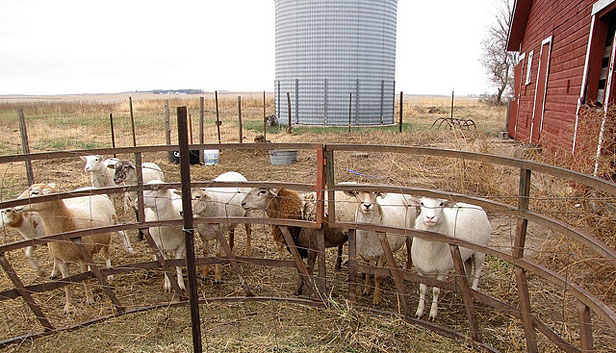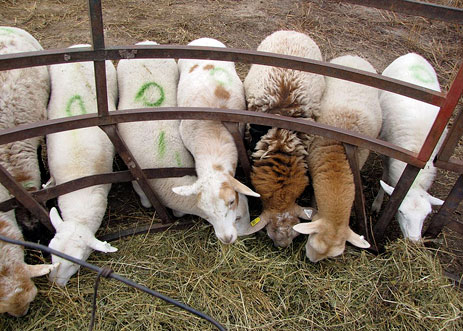 Are ewe hungry? Sheep waiting to eat.Photo: Steph Larsen
Are ewe hungry? Sheep waiting to eat.Photo: Steph Larsen
Fall has turned quite chilly in Nebraska, and with temperatures dropping into the 20s at night, our lovely green pasture has turned largely brown. While our lambs are still eating grass, it’s time for the ram and his ladies to come into the barn for the winter.
Moving sheep has been a lesson in motivation, and sheep basically have two: desire (usually for food, sometimes for sex) and fear.
These two motivations interplay in a funny way when they’re in close proximity to people. On the whole, they’re afraid of people because they weren’t bottle-fed, but on the other hand, they know that when we come into their paddocks, they might get moved onto new grass. Since we try to space the sheep so they eat most of the grass in a paddock before we move them, they are usually pretty motivated to follow us around until the new grass is found.
 Dinnertime: The ewes are rather colorful right now thanks to markings indicating that they’ve been bred, wormed, or vaccinated.Photo: Steph LarsenBut once they have full bellies, we’re suddenly scary again.
Dinnertime: The ewes are rather colorful right now thanks to markings indicating that they’ve been bred, wormed, or vaccinated.Photo: Steph LarsenBut once they have full bellies, we’re suddenly scary again.
There have been a few occasions where we’ve had to move them across our small farm, and up until about a month ago we relied on their fear. We guided them from behind, careful not to be directly behind them where they can’t see us. I often sing to them, too, so they know exactly where I am. Though dogs can be extremely useful in these cases and we do have an English Shepherd, Arrow hasn’t been trained well enough to herd the sheep.
As you might imagine, herding them from behind has definite downsides in that the sheep may not go where we want them to. We’ve learned that they don’t like to go into the shadowy space between our grain bins or into dark buildings, even if they’ve been in them before. Their flocking instinct usually works to our benefit, though we have one ewe who occasionally charges straight for us and ends up taking the whole flock with her.
As a general rule, sheep carry their shelter on their back, making them one of the easier livestock to house. Our barn was probably built in the 1920s and is quite drafty, but Katahdin sheep are tough and didn’t seem remotely bothered earlier this week when it rained on them. We bring them into the barn make it easier to feed and water them, and to make sure they don’t tear up the pasture now that it’s not growing anymore.
Even though our sheep until now have been entirely grass fed, we started giving the mamas a little bit of cracked corn every day in order to train them to follow the white bucket. I was surprised at how much they loved the corn, and their desire for grain now overrides their fear of a human — if that human is holding a bucket. We used this to our advantage when moving them to the barn, and it took all of a few minutes even though last time they were in the barn they got a shot and a mouthful of garlic and molasses (to combat intestinal worms).
By comparison, previous attempts to move them across the farm have taken the better part of an hour, required all the patience I had as well as a length of rope and some strategically placed electric fence. By using desire, I got them to go exactly where I needed them and no one got frustrated.
I think that people, like sheep, are also motivated by desire and fear. My sheep remind me that in my everyday interactions with others, I should try to sweeten my requests to motivate people instead of getting angry or frustrated.
The behavior of my sheep also gives me hope, because I’ve been disheartened by how much fear is being used to manipulate us as a society. Politicians try to scare us with slogans of “government takeovers” to capture our vote, law enforcement blast us with images of terrifying brown people of differing religions so we don’t argue when they threaten our civil liberties. Climate change legislation will kill jobs! We need genetically modified crops or children will starve! Stock up on dehydrated meals for the end times are nigh!
Be afraid! BE VERY AFRAID!!!!
I’ve been reading Einstein, by Walter Isaacson, which is a hugely awesome book. In the last chapter, Isaacson writes:
By then Einstein had finally discovered what was fundamental about America: it can be swept by waves of what may seem, to outsiders, to be dangerous political passions but are, instead, passing sentiments that are absorbed by its democracy and righted by its constitutional gyroscope … ‘God’s own country becomes stranger and stranger,’ Einstein wrote [his son] Hans Albert that Christmas, ‘but somehow they manage to return to normality. Everything — even lunacy — is mass produced here. But everything goes out of fashion very quickly.’
I like that. It helps, too, to remember that fear as motivation is hard to direct: like herding sheep from behind. Soon the fearful energy will scatter people in all different directions. Motivating with desire will get the sheep in the barn quickly — and safely.



